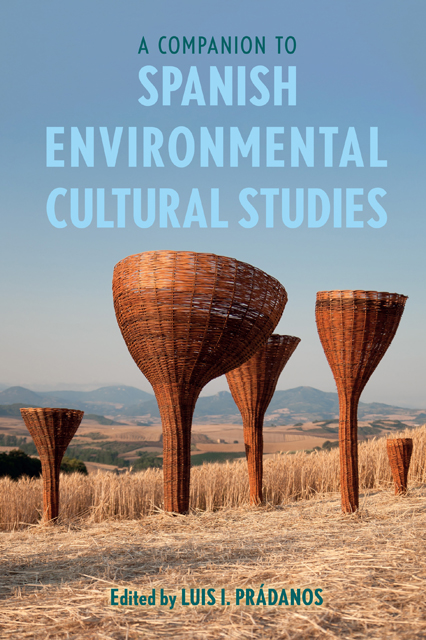Book contents
- Frontmatter
- Contents
- List of Illustrations
- List of Contributors
- Note on the Translations
- Acknowledgements
- Introduction: Spanish Environmental Cultural Studies
- Part I Environmental Cultural History and Political Ecology
- Part II Water and Power
- Part III Ecologies of Memory and Extractivism
- Part IV Animal Studies and Multispecies Ethnographies
- Part V Food Studies and Exploitative Ecologies
- Part VI Ecofeminism
- Part VII (Neo)Colonial and Racialized Ecologies
- Part VIII Tourism and the Environmental Imagination
- Part IX Eco-Mediation and Representation
- Part X Trash and Discard Studies
- Bibliography
- Index
9 - Multispecies Ethnographies in the World of Things (Crematorio and En la orilla by Rafael Chirbes and Óliver Laxe’s O que arde): On the Need to Ecologize Humanities
Published online by Cambridge University Press: 08 June 2023
- Frontmatter
- Contents
- List of Illustrations
- List of Contributors
- Note on the Translations
- Acknowledgements
- Introduction: Spanish Environmental Cultural Studies
- Part I Environmental Cultural History and Political Ecology
- Part II Water and Power
- Part III Ecologies of Memory and Extractivism
- Part IV Animal Studies and Multispecies Ethnographies
- Part V Food Studies and Exploitative Ecologies
- Part VI Ecofeminism
- Part VII (Neo)Colonial and Racialized Ecologies
- Part VIII Tourism and the Environmental Imagination
- Part IX Eco-Mediation and Representation
- Part X Trash and Discard Studies
- Bibliography
- Index
Summary
Multispecies thinking has proven to be necessary in times of the current pandemic that, in the view of many, arose as a consequence of extractive economies. Bulldozers and excavators penetrated too far into natural spaces, creating increased opportunity for viral spillovers between animals and humans that extended all over the planet (Huong et al., Rodríguez, Schotwell, Terradas, and others). The pandemic has resulted from problematic relationships between technologies, economies, and ecosystems. However, the widespread changes to everyday life and the vulnerabilities in political and economic structures that the pandemic has exposed provide a unique opportunity for change. The transformation of our life and economy, to be sustainable, fair, and caring for all, should be based on thinking within a multispecies framework, sensitive also to the transformative power of technologies. Educating on how to think within these frameworks and use them to produce change is beginning to be considered through the environmental humanities.
Environmental humanities is a multidisciplinary platform of thought that understands everything that happens to be mediated not only by humans and their institutions, but also by viruses, ecosystems, and things: “earth beings,” such as mountains and also by chemical substances and technological artifacts. Anthropologists Anna Tsing and Eduardo Kohn suggest that we need to relearn new ways of seeing, perceiving, and thinking to rebuild our relationships with the non-human realm. Oftentimes, this relearning can find inspiration in the epistemologies of indigenous communities and their relationships with animals and plants. After spending several months with the Ávila-runa, a Kichwa community in the Ecuadorian rainforest, Kohn came out of the forest and has termed soul-blind those who are unable to recognize their situatedness within an ecology other than human selves. Tsing compares research focused on interactions with other species to a study of polyphony. She recommends noticing the ways in which the various rhythms of distinct beings (both human and otherwise) intertwine, producing complex webs of relationships. These relationships come with diverse forms of mutual “understanding” and constitute the dynamics of each place. Multispecies vision involves a polyphonic attention to the various movements and interactions of forms of life and matter over time.
- Type
- Chapter
- Information
- A Companion to Spanish Environmental Cultural Studies , pp. 111 - 118Publisher: Boydell & BrewerPrint publication year: 2023



